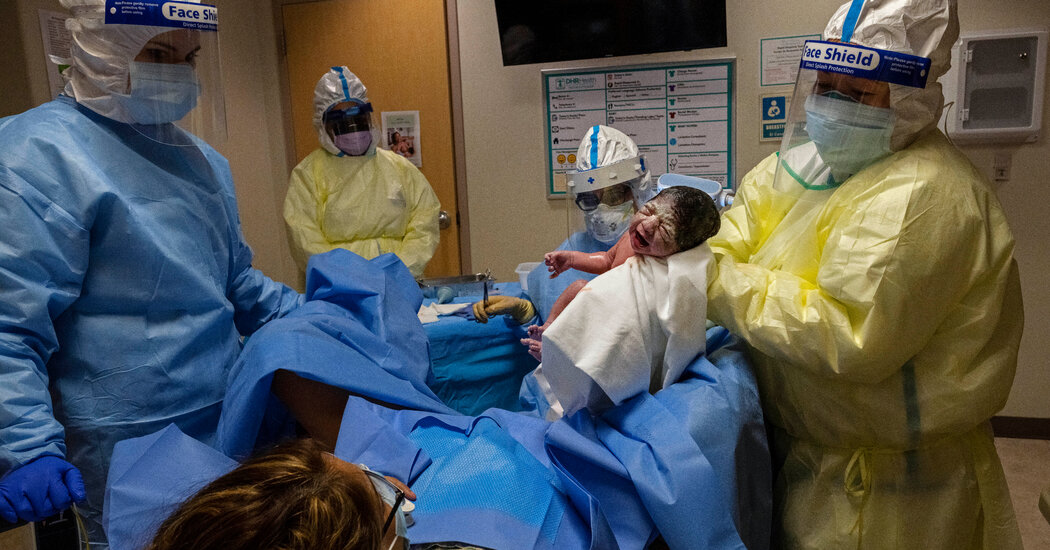When Zaneta Thayer, an anthropologist at Dartmouth College, asks students in her evolution class what words come to mind when they think of childbirth, almost all of them are negative: pain, screaming, blood, fear.
Then she asks if any of the students has ever seen a woman give birth. Most have not.
Curious about how cultural attitudes and expectations affect the physical experience of childbirth and its outcomes, Dr. Thayer began a study to assess the prevalence of tokophobia, the medical term for a pathological fear of childbirth.
Though tokophobia has been well studied in Scandinavian countries, some of which screen pregnant women and offer treatment for it, little research has been done in the United States. Dr. Thayer’s online survey of nearly 1,800 American women found that in the early days of the pandemic, tokophobia may have affected the majority of American women: 62 percent of pregnant respondents reported high levels of fear and worry about childbirth.
The results were published last month in the journal Evolution, Medicine, and Public Health.
Other scientists who study childbirth said the levels of fear in the United States were higher than those reported in Europe and Australia, which are lower than 20 percent. But they noted that birthing conditions in the United States are different and that pandemic circumstances may have exacerbated fears.
Some level of apprehension about childbirth is universal. It may be an adaptive behavior favored by evolution that prompts women to seek out assistance and emotional support during labor, said Karen Rosenberg, professor of anthropology at University of Delaware.
“Other animals may give birth in a social context, but humans are the only primates that actively seek and routinely seek active assistance at birth,” said Wenda Trevathan, a senior scholar at the School for Advanced Research in Santa Fe, N.M., an anthropology think tank.
Extreme pathological fear may be maladaptive, however, causing some women to have unnecessary cesarean sections or to refrain from becoming pregnant.
The new study has limitations. The prenatal and postpartum data were collected during the first 10 months of the pandemic, when the health care system was under extreme duress. The sample was not nationally representative, consisting of a disproportionate percentage of white and higher-income women.
Half of the women had never given birth, and more than one-third had experienced high-risk pregnancies.
More than 80 percent of the women said that because of the pandemic, they were worried that they would not have the support person they wanted in the hospital with them while in labor, that their baby might be taken away if they were diagnosed with Covid or that they might infect their baby if they had the virus.
Black mothers, who face almost three times the risk of dying from pregnancy-related complications, were almost twice as likely to have a strong fear of childbirth as white mothers.
“Black women are more likely to have complications or die in childbirth,” one pregnant woman said in her response, adding that her concern was heightened because she was not assured she would have a family member or advocate in the hospital with her because of Covid. “Who’s going to speak up for me?”
Women with tokophobia were almost twice as likely to have a preterm birth, or a baby born before 37 weeks of gestation, the study found. Preterm babies are more likely to have health problems and are at higher risk for disability and death, often spending time in neonatal intensive care.
The connection does not prove a causal relationship between fear and preterm birth. But the risk of preterm birth among women with high levels of fear and worry remained high even after adjustments were made for other factors, such as cesarean sections.
The study also found links between fear and higher rates of postpartum depression and the use of formula to supplement breastfeeding. It did not find an association between tokophobia and a higher rate of cesarean sections or low birth weight among newborns.
Dr. Thayer said that fear of childbirth might be “an underappreciated contributor to health inequity.”
“Individuals who fear unfair treatment and discrimination in obstetrical settings likely have greater fear of childbirth, which could increase complications across the perinatal period,” she said.
In the United States, Black women experience more preterm births than any other race or ethnic group; the rate is about 50 percent higher than that of white women. About 14 percent of Black infants are born preterm, compared with slightly more than 9 percent of white and Hispanic infants.
Earlier studies have linked preterm birth to psychosocial stress, but this study is the first to find an association with tokophobia, Dr. Thayer said.
Fear of childbirth was higher among all socially disadvantaged women, including lower-income women and those with less education, she found. Women who were single, those who were receiving care from an obstetrician and those who were having their first child were also more likely to be more fearful.
Women with high-risk pregnancies and those suffering from prenatal depression were also more likely to fear childbirth, Dr. Thayer found.




